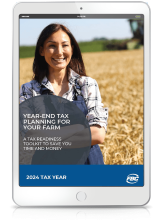Contents
- 1. Is cash or accrual accounting better for your farm business?
- 2. Deferred cash grain tickets
- 3. Claim tax-deductible expenses and capital losses in the current year
- 4. Time selling and purchasing of assets
- [Free Download] Year-End Tax Saving Strategies for Your Farm – A Tax Readiness Toolkit to Save You Time and Money
- About FBC
Last updated: Oct. 24, 2021
When you’re busy with the harvest, or preparing for the upcoming season, taxes are probably the last thing on your mind. Why worry about taxes now?
Proper tax planning is a year-round process. By planning now, you can take advantage of strategies to lower your tax bill in advance of the filing deadline – while there’s still time.
The strategies in year-end tax planning involve:
1. Deferring income and taxable capital gains until the next tax year.
2. Bringing anticipated tax-deductible expenses and capital losses into the current tax year.
We outline four methods you can use in year-end tax planning to help reduce your tax bill.
1. Is cash or accrual accounting better for your farm business?
It’s important to think about cash vs. accrual accounting for your farm. In cash accounting you record a sale or expense only when the cash is received or paid. Inventory is not included in the calculation of income.
The benefits of cash basis accounting are:
- It’s simple to maintain
- It’s easy to determine when a transaction has occurred
- You can track how much cash you have at any given time
- Since transactions aren’t recorded until cash is received or paid, your income isn’t taxed until it’s in the bank
The downside is when you are forced to sell inventories, cash accounting could leave you with unusually high taxable income.
With accrual basis accounting you record income and expenses when a sale or purchase is made, even if the money hasn’t changed hands yet.
The benefits of accrual accounting are that you get a better picture of income and expenses in a set period of time, but the downside is that without proper tracking of your cash flow, it can seem like you’re more profitable than you think.
You could have more tax to pay if you recorded a transaction as part of your income in December 2020 but you didn’t receive payment until January 2021.
Talk to a tax professional to find out if cash or accrual accounting is better for you.
2. Deferred cash grain tickets
If you sell grain this fall (it must be wheat, oats, barley, rye, flax, canola or rapeseed) to the operator of a licensed elevator, the operator can issue you a cash purchase ticket or deferred cash purchase ticket.
The deferred cash purchase ticket lets you report your income in the year after the grain is delivered.
This way you reduce how much you’re being taxed in the current year.
3. Claim tax-deductible expenses and capital losses in the current year
If you are a sole proprietor or in a partnership, look at the “Statement of Farming Activities” document you receive with your tax return.
It lists several expenses you can claim on your tax return, some of which include feed, livestock purchases, veterinary fees, machinery expenses, building repairs and maintenance, crop insurance, machine rentals and more.
If you have capital losses (when you dispose of qualified farm property) you could time the triggering of capital gains and capital losses to reduce your overall tax burden.
Try selling during a year when your income is lower to save you money on taxes.
If you only have a capital loss, you can carry it forward to offset future capital gains.
4. Time selling and purchasing of assets
A good way to lower your tax bill is to make use of the capital cost allowance.
High-value items with a long-lasting life in your business (like a tractor or silo) could qualify for a capital cost allowance deduction.
Since they wear out over time, you can deduct their cost over a period of several years.
There are different rates of depreciation depending on the item. For example, a tractor has a 30% depreciation rate. Click here for our guide to capital cost allowance for farmers.
If you have depreciable assets (machinery or equipment) to sell, it may be better to wait until the new fiscal year. The delay lets you claim another year of capital cost allowance (CCA).
Alternatively, if you are in the market for depreciable assets, buy them before your fiscal year-end to increase your CCA claim by half of the annual rate in the year the item is acquired.
[Free Download] Year-End Tax Saving Strategies for Your Farm – A Tax Readiness Toolkit to Save You Time and Money
Engaging in tax planning now allows you to get organized and assess what cost-saving actions you can take before tax year-end to lower your future business or corporate taxes next spring.
Consider this toolkit your roadmap to help you get organized, reduce your tax burden, and keep more money in your pocket. In here you’ll find some of the most successful year-end tax planning strategies we employ for our tax Members who farm or own agribusinesses.
About FBC
FBC was founded on the belief that Canadians should receive every benefit of filing their taxes. Three-generations later, our family-owned business continues to support farmers, truckers, trades and other small businesses minimize their taxes, simplify their books, and pay their employees.
Take 15-minutes to connect with us. Let’s see if we’re a good fit for you and your business.



